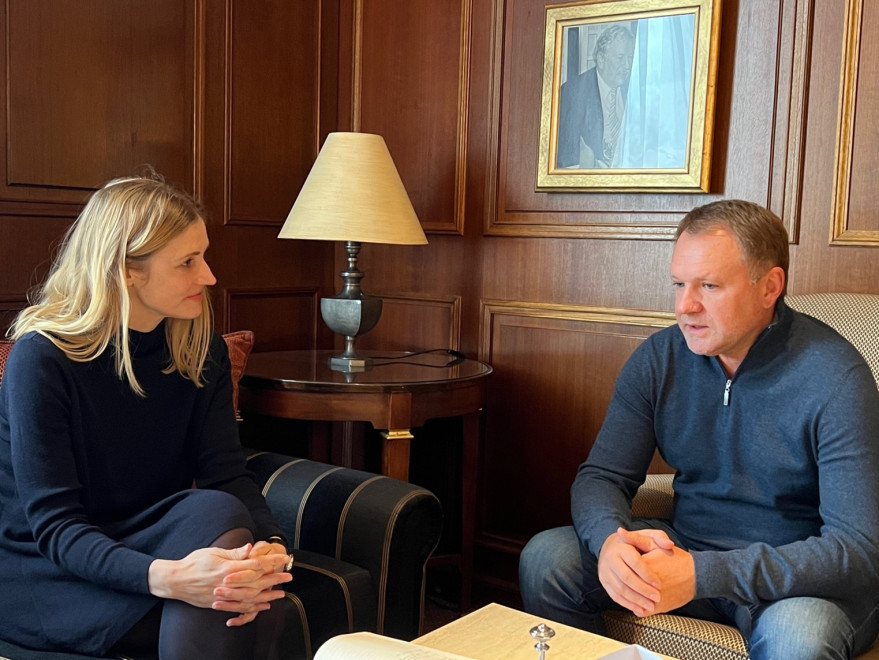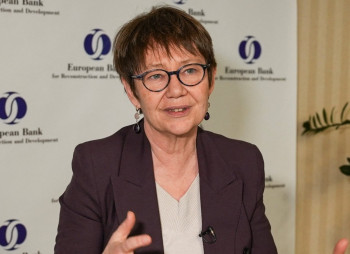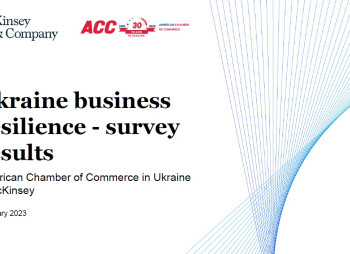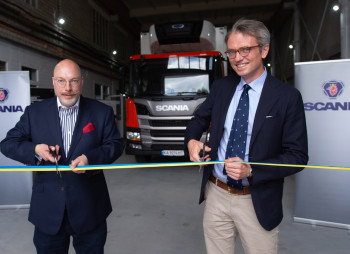I thank you for taking the time for this interview. The topic of our conversation is the post-war reconstruction of Ukraine. How does Ukrainian business feel today? Especially business that is not limited to one enterprise or one field of activity.
Because of the war and the processes accompanying it, we clearly see a decrease in the pace of economic development. It has become virtually impossible to make plans for development, which are usually made by any business. A large number of large industrial enterprises have stopped. Companies do not have enough electricity, gas or water. Added to this is the problem with the outflow of people, which is especially acute in areas where there are active combat operations or which border such territories. Many Ukrainian companies are afraid to invest in reconstruction and development of their businesses. But how long this trend will last depends solely on the duration of the war. When the war is over, businesses will have a chance to reconsider their development plans, and economic growth will begin.
- What happens to your enterprises today? Do they remain idle?
Some businesses are standing, some are in occupied territory. For example, in Kreminna, we were developing a gas production enterprise, but today Kreminna is in an active combat zone.
- To what extent can you today, as an entrepreneur, plan the operation of your enterprises after the war?
Theoretically it is possible. Knowing our assets, the degree of destruction of our enterprises and general trends in our industry, we understand how much additional investment we need to make in order to bring them to the pre-war level. I still see a more serious problem, which many companies are facing today, not in investments, but in the labor outflow. A lot of people have left Ukraine, and the government will have a serious task to stimulate their return. And in general, in terms of investment, we have not stopped for a minute, because the industries in which we work require constant development - if we stop today, then in a year we will not start.
- Are you talking about coal mining now?
The coal industry is one of them. We have projects that we cannot stop technically. Although they are close to the active combat zone. But in any case, investing is a long process.
- If we talk about the Ukrainian economy as a whole, where should we start its recovery?
- Which sectors of Ukraine's economy have the best chances for modernization? And I do not speak about restoration or identical recreation of what was before, but about the possibility of modernization.
When speaking about modernization, we should start with changing the very approach to investment by foreign companies. Historically there has been a situation when the priority sectors for investment in Ukraine have been raw materials industries. In other words industries with low added value and lack of deep processing. Ukraine has large reserves of raw materials, but the development of such industries will do little to strengthen its competitiveness. Remember, for example, what large volumes of wood were exported from Ukraine, and it was in the form of raw materials, lumber, and not the final product. We need to develop export of non-raw materials. The creation of technological parks may become a scheme for development of industries, which may yield a product with high added value. As an example, some time ago together with our Italian partners we were considering a possibility to modernize the Zaporozhye aluminum plant. And the most effective project for its modernization turned out to be a variant when the plant was complemented with a technology park. In this case the plant would produce primary aluminum, and within the technopark it would be used to produce parts with high added value. In our case, it would be car parts. There are many such examples in Austria. You produce gearboxes for the whole world, for example.
- What role can foreign entrepreneurs who invest in Ukraine's economy play in its recovery?
In any case, historically Ukraine has always stably attracted foreign investment. After the war began, there was an understandable drop in their volume, but according to the Ministry of Finance, already in the second quarter of last year that drop was replaced by growth. And at the end of the year, we had a positive balance of investment. By the way, I want to point out that Austria is the sixth largest country in terms of investment projects. It is interesting that even such countries as Poland, which has rendered enormous help to Ukraine since the beginning of the war, are lower (10th place). Our relationship with Austrian companies is a good example of how business can cooperate after the war is over.
- Does Ukraine need additional foreign investments to restore economic growth faster after the war? The example of Greece shows that there are pros and cons to foreign investments. Experts have noted that after the financial crisis in Greece, a large part of the local economy ended up in the hands of foreign investors. If they gain too much control over the country's economy, it can slow down its economic growth.
The situation in Ukraine is somewhat different. The arrival of European investors definitely means stability inside the country. If there is European money in Ukraine, it is already a guarantee of support, including war and peace issues. The model "we give you our money, deal with your problems yourselves" does not suit us. Ukraine seeks membership in the EU, it wants to integrate into it. EU is a big family where everybody is united and interconnected. That's why we need your technologies, we need joint ventures with European companies. To reach a completely different economic level and ensure both Ukraine's security from the military point of view and its competitiveness at the level of Europe and the whole world. I am impressed by the approach of European companies. It is a partner relationship, and many European and Austrian companies have partner companies all over the world. We also have this experience. We established a joint venture with Sany Group of China and I know that this company also works with Palfinger of Austria.
- You mentioned a Chinese company called Sany Group. In what areas are you cooperating?
Cooperation with Sany Group is cooperation in mining equipment production. This company also produces equipment for construction and wind power generation.
- You mentioned wind generation. Are you interested in investments in alternative energy sources?
Yes, we are interested in such investments and over time this area in Ukraine will actively develop. But, unfortunately, today it is actually impossible to engage in alternative energy in Ukraine. Most manufacturers do not even consider applications for production of such equipment, in particular, for the use of wind energy, and its delivery to our country. Plus the negative impact is the inability to fully use the opportunities of the Black Sea ports. The same can be said about solar energy, due to the damage to power lines. Wind and solar can definitely become a 100% alternative to traditional energy sources, but to build such a plant in Ukraine today is problematic. And even if we manage to build one, it will also be a problem to deliver energy to consumers. Even though there is a shortage of energy in the Ukrainian energy system.
- But do you plan to invest in them in the future?
There are several wind farm projects in Ukraine today that could be built. At the moment in calmer western regions there is work on gathering information, analyzing possibilities, developing projects. But you have to understand that even in the most developed countries of Europe it takes at least two years to build wind farms. I am sure that this sector will actively develop after the war is over, but for now such construction is unlikely because of the simple logistics of delivery. Difficult delivery means a significant increase in the cost of energy produced, especially compared to what can be built in the EU. At the same time, if we talk about our group of companies, we have a wind farm project, which we will start building right after the war. We also bought a network of electric charging stations. They will be equipped with the most powerful 350-kilowatt vehicle charging units in Europe. We plan to install the first stations as early as this month. This project will start in Kiev.
- Let's return to questions about politics. If you compare state policy before and after the war, what has to change at the state level for the economy to develop?
We can paraphrase Churchill's golden words: "In a country at war, I will never comment on my government. There are some things that are not up for discussion. Whether someone likes it or not. Zelensky is the president of a country at war. Who is doing everything in his power to bring victory closer. I don't know when the war will be over, but we will all support the policies the government is pursuing today.
- And if we talk about the Ukrainian economy in more general terms? Just compare Ukraine's economy before the war and after it started? After all, Ukraine has already gone through a lot of reforms related to the desire to enter the EU. What is needed for its further development?
First of all, for the economy to develop, the war must end; without that, Ukraine's economy will not begin to work. Secondly, Ukraine must fulfill the requirements set forth in the EU Association Agreement as soon as possible. It is about those seven points that we all know and talk about so much. And finally, after or on its way to the EU, Ukraine must have fair access to the European market. This is especially important because on a global scale, everyone has already seen Ukraine's crucial role in supplying grain and food. In this connection, the example of Austria, which provides itself with 91% of its own food, is very interesting. And yet even in pre-war times there were supplies of agricultural products from Ukraine to such a country.
- How to control the funds that will be allocated to Ukraine? Are traditional methods of control sufficient for this purpose? Several options have been considered within the EU, including the creation by Ukraine of a new agency, reinforced by a supervisory board, which would include representatives of the EU.
This question has a certain background. Is Ukraine today a member of NATO? De jure no, de facto yes. According to the number of armaments we get, according to the standards our army switches to, we are in fact already a member of NATO. And we cannot imagine further development of Ukraine without NATO. But there are strict procedures for such accession. There are rules and they must be observed. Is Ukraine a member of the EU now? Not yet, but we will be there anyway, it's only a matter of time. Can Ukraine recover on its own today? Definitely not. It needs assistance, including from the EU. So why should we be afraid of EU control if we want to be part of it ourselves? Control over the use of funds is as much assistance from your side as military, financial or humanitarian aid. And as for the technical aspects, in my opinion, such control should be exercised within a single body. In this matter, the EU countries should go as a block, not separately. Just as they help us to fight, help us with weapons, in the same way they should make decisions on finance and control.
- Traditionally, when the EU allocates funds, it demands fulfillment of reforms at the same time. Is this option suitable for Ukraine?
For all the last years Ukraine has been declaring its desire to become a part of the EU. That is why the creation of state body, which will control the use of means, tell what mechanisms are necessary in judicial system, law enforcement, media - it is a great advantage for Ukraine. We will get away from internal corruption scandals. We will have a model in which we will become Europe faster. And Europe, not in geographical sense, but in mental sense. It will definitely speed up our integration process. Moreover, the creation of a single body will enable us to exercise control more effectively and not to get bogged down in details. When everyone is responsible for something, there will be no order. We want to overcome the path to the EU as quickly as possible, and mentality is the main factor to speed up this process.
- You mentioned that the problem for economic growth is the large number of people who have left Ukraine. What should be done to encourage people to return home?
The sociological data on what percentage of people who have left Ukraine are willing to return home is quite unreliable. These people can be divided into many different groups - people from areas where there is active fighting. People from calmer areas who wanted to keep their children and families safe. People who have lost their homes and have nowhere to live. What can be done to bring them back? First, provide such people with housing. Secondly, provide them with jobs. For our part, for example, we have already begun to develop such solutions. Our idea is to create residential complexes with production cycles. Not just to bring people back, but to provide them with jobs. Our pilot project will be launched in Kyiv region, but such complexes can be launched all over the country. The country can't wait and its economy has to develop. So it's time to do something today in areas where there are no active military operations.
- And a separate question about your television channel. When does it begin broadcasting?
The channel begins broadcasting on February 1. While our application is under consideration by the National Television and Radio Broadcasting Council, the channel will broadcast the all-Ukrainian news marathon " United News" only in a digital format. And after the reissuance of the license, the channel will start under the logo of Ukraine World News and expand its broadcasting to satellite.






